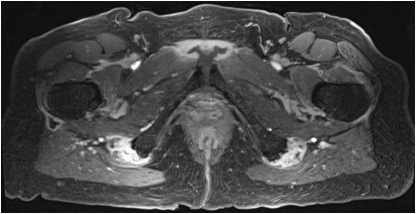Background/Purpose
Polymyalgia rheumatica (PMR) is a disease of widespread musculoskeletal inflammation characterized by pain and stiffness in shoulder and hip girdles. Here we report the first use of whole-body MRI to study the clinical spectrum of PMR in the rheumatology clinic. We hypothesized that PMR is characterized by an extracapsular pattern of inflammation.
Methods
38 participants underwent whole-body MRI: 22 consecutive cases of clinically-diagnosed, active PMR identified by two rheumatologists with a special interest in PMR and followed up for a mean of 21 months; and 16 patients (controls) selected from a larger inflammatory arthritis (RA) cohort. 4 of the PMR patients did not have gadolinium enhancement, due to contra-indications. Anonymised gadolinium-enhanced MRI scans were consensus scored in axial view using semi-quantitative grading, and the features best discriminating PMR from RA were identified. Patients were treated after the MRI with 15mg prednisolone and then asked at follow-up whether they now felt back to normal.
Results
A characteristic pattern suggesting PMR was classified as “PMR pattern” by the blinded scorers; this could be identified both on the gadolinium-enhanced and non-enhanced scans. The features best discriminating PMR from RA were inflammation in the following sites: extending up around the rim of the acetabulum (“peri-acetabular”); around the ischial tuberosity; within the hip joint; around the greater trochanter; and around the symphysis pubis (Figure). Of all the MRIs performed in patients with a clinical diagnosis of PMR, “PMR pattern” was significantly associated with patient-defined glucocorticoid responsiveness (p=0.01).
Conclusion
A characteristic, extracapsular pattern of inflammation in PMR can be identified, and defines a subgroup of the clinical spectrum of PMR with excellent patient-reported glucocorticoid responsiveness. MRI is particularly useful in assessing inflammation of structures around the pelvis.
Disclosure:
S. Mackie,
None;
C. T. Pease,
None;
E. Fukuba,
None;
P. Emery,
AbbVie, Bristol-Myers Squibb (BMS), MSD, Novartis, Pfizer Inc, Roche, and UCB Pharma,
2,
AbbVie, Bristol-Myers Squibb (BMS), MSD, Novartis, Pfizer Inc, Roche, and UCB Pharma,
5;
R. J. Hodgson,
None;
J. E. Freeston,
None;
D. McGonagle,
None.
« Back to 2014 ACR/ARHP Annual Meeting
ACR Meeting Abstracts - https://acrabstracts.org/abstract/whole-body-mri-reveals-characteristic-extracapsular-pattern-of-inflammation-in-polymyalgia-rheumatica/

